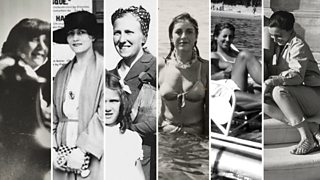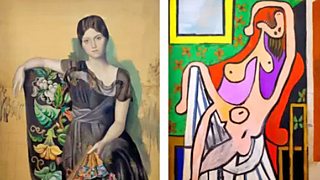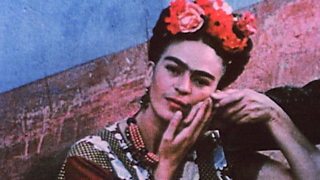Vote now: Classic vintage posters to send you to the polling station
23 June 2016
To the polls, ye sons and daughters of freedom! Or to put it more prosaically - and here we quote HM Government - “On Thursday 23 June 2016 the UK will vote either to remain in or leave the European Union”. It will be a historic vote and to inspire you, and to send you to your local polling station, here are just a handful of historic posters exhorting citizens to vote on a wide variety of issues. The choice is yours.
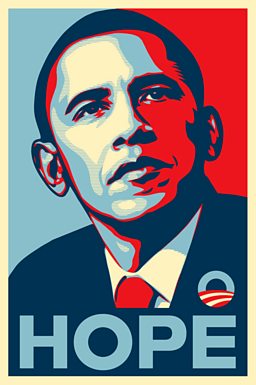
USA, 2008
The Obama "Hope" poster was designed by street artist Shepard Fairey.
Fairey, talking to Esquire magazine in May 2015, said, "I hate to say Americans are ignorant and lazy, but a lot of them are ignorant and lazy... When you live in a place that has a lot of good things that make life easier, it's easier to take them for granted. But what frustrates me to no end are people who want to blame Obama or blame anything that is something that if they were actually doing anything as simple as voting, it might not be as bad as it is."
Watch 'Hope' artist Shepard Fairey launches east London exhibition
BBC News, 2012
Watch Obama named best design
BBC News, 2009
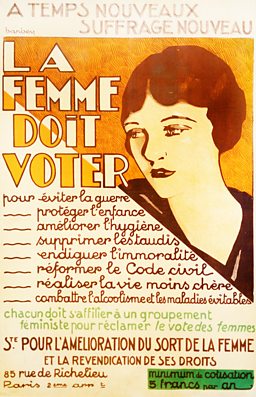
France, 1925-28
Votes for Women: French Women's Suffrage Poster
Watch The Struggle for Women's Suffrage
BBC News
A look back at the movement that gave women the right to vote in the early part of the 20th century.
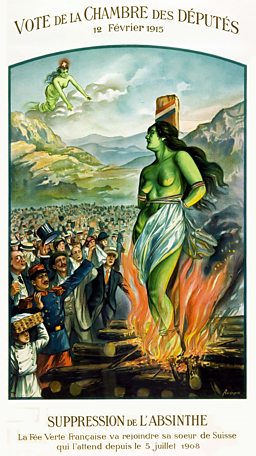
France, 1915
Five years after absinthe was banned in Switzerland, the French Chamber of Deputies voted to ban its sale in France. This anti-prohibition chromolithograph, designed by Audino, presented the absinthe 'Green Fairy' as Joan of Arc, burning at the stake while her ghostly Swiss sister looked on.
Listen to Absinthe Makes the Art Grow Fonder
BBC Radio 4
Novelist and poet Michèle Roberts presents a history of absinthe and its influence on art and writing.
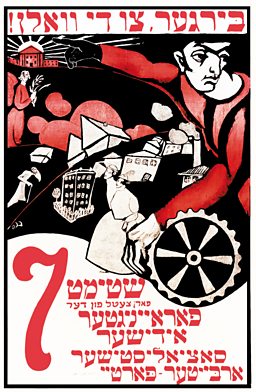
Russia, 1917
This poster shows the voting in the free elections which followed the disbanding of the Duma during the Provisional Government led by Aleksandr Kerensky. The Bolsheviks had called the election following their seizure of power in the October Revolution, believing it would give them a mandate to govern. The other parties in the Constituent Assembly, which convened following the elections, refused to support Bolshevik leader Lenin's idea of a soviet republic. The Assembly was disbanded the following day, ushering in the All-Russian Congress of Soviets.
Listen to The Russian Revolution: A Bolshevik Coup
Witness, BBC World Service
On 7 November 1917, Lenin and his Bolshevik party overthrew the Provisional Government led by Alexander Kerensky. We hear Kerensky's comments from the BBC archive.
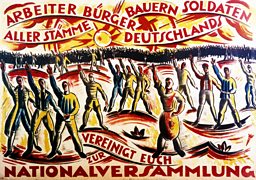
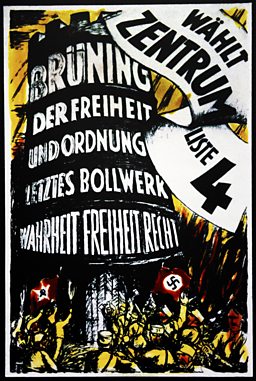
Germany, 1932
The Centre Party, one of the mainstays of the Weimar Republic, attempted to portray itself as the party of the German Constitution in this anti-Hitler poster produced for the Reichstag elections of July 1932: 'The last bulwark of freedom and order. Truth, freedom, rights. Vote Center!'
In the wake of the Wall Street Crash of 1929 there was mass unemployment in Germany and banks crashed, leading to skyrocketing support for parties on both the extreme left and right. After hovering on the fringes of German politics during the 1920s, this election finally made the Nazis the largest party in the Reichstag, with 37.3% of the vote.
This would be the first of three electoral victories for Hitler but, with no overall majority and with a strong vote for the Communists, he could not form a government.
Fresh elections were held in November 1932, with the Nazis remaining the largest party but with 2 million fewer votes, reducing their share to 33.1%. Even so, after weeks of machinations and maneuvering, Hitler was appointed Chancellor on 30 January 1933 at the invitation of Hindenberg. By March he had dictatorial powers courtesy of the Enabling Act, which allowed him to pass laws without Reichstag approval. Political parties, organisations and unions not associated with the Nazis were soon disbanded.
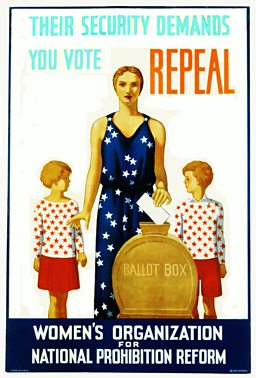
USA, 1932
The Women’s Organization for National Prohibition Reform was founded by Pauline Sabin in 1928. This poster encouraged voters in the 1932 election to favour an anti-Prohibition candidate. On 5 December 1933 prohibition came to an end. For almost 14 years it had been illegal to sell alcohol in the USA. The law was widely flouted and organised crime had flourished under the policy.
Listen to Prohibition in the USA
Witness, BBC World Service
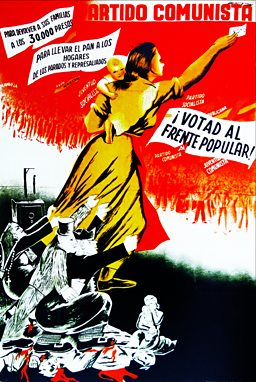
Spain, 1936
Spanish communist party election poster advocating that voters support the Popular Front (Frente Popular), a broad left-wing coalition of parties that won the elections with a large majority in February 1936; on 17 July 1936, General Franco and others launched the coup d'etat that began the Spanish Civil War.
Listen to Spanish Civil War
Witness, BBC World Service
More from BBC Arts
-
![]()
Picasso’s ex-factor
Who are the six women who shaped his life and work?
-
![]()
Quiz: Picasso or pixel?
Can you separate the AI fakes from genuine paintings by Pablo Picasso?
-
![]()
Frida: Fiery, fierce and passionate
The extraordinary life of Mexican artist Frida Kahlo, in her own words
-
![]()
Proms 2023: The best bits
From Yuja Wang to Northern Soul, handpicked stand-out moments from this year's Proms
